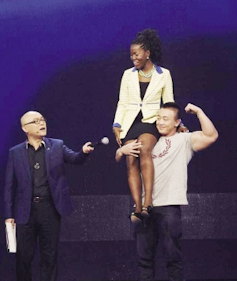How a comedy skit demonstrates how clearly China sees itself as the continent's saviour.

A skit on China’s English language TV station CCTV’s Spring Festival Gala featuring ‘blackface’ actors has gone viral. Supplied
You could compile a long list of ‘blackfaces’ in East Asian media over the last decade. But the latest version this Euro-American racist archetype in Chinese media is by far the most controversial – a skit on China’s English language TV station CCTV’s Spring Festival Gala featuring ‘blackface’ actors. Like the others on the growing list of racist incidents, this one has also gone viral.
Beyond the ‘blackface’, the skit’s story is rather simple but still problematic. Carrie, an 18-year-old Kenyan stewardess trainee, asks her Chinese teacher to pass as her boyfriend to avoid a blind date organised by her mother. Carrie doesn’t want to get married yet. She wants to work and then go to China to study.
In the skit’s resolution, Carrie confesses to her mother and explains her desire to go to China. It becomes clear that she sees China as a way to escape tradition (and her mother’s traditional views on marriage).
Carrie’s mother then starts praising China’s role in Africa and agrees to Carrie’s plans, shouting
I love the Chinese! I love China!
The skit was intended to highlight the positive aspects of China-Africa relations. Instead, it presented a narrative in which China is seen as a solution to Africa’s backwardness.
China, the saviour
This episode echoes the broadcast of a similar story featured on ‘If You Are the One’ – a highly popular Chinese TV dating show a few years ago.
In my analysis of the show at the time I explained how Xiao De (a participant from Guinea Bissau) was portrayed as a free-spirited girl, trapped by tradition. Xiao De saw going to China as a way to escape her fate (an arranged marriage), study, and become independent.
In the dating show, Xiao De is looking to marry a Chinese man. As with Carrie, moving to China and marrying a Chinese is her way of escaping tradition and entering modernity — a Chinese version of it.

These skits reproduce a narrative that is representative of China’s general approach to Africa. Both official and popular Chinese narratives about Africa consistently try to construct an image of the continent as China’s ‘damsel in distress’.
Africa is depicted as a young and beautiful woman who needs to be saved by a male hero. In the end, the woman usually marries her rescuer. The narrative is also always gendered – China is portrayed as the (modern) male hero and Africa the princess in jeopardy.
Multiple versions of this have been repeated over the decades. In short, behind the Gala’s ‘blackface’ lies a consistent top-down, ego-boosting effort to see and represent China as a way for Africa to enter modernity.
Africa as the past, China as the future
The Spring Festival Gala is a programme full of skits. While the skits are normally comedic, they generally intend to inform and educate the audience about a particular topic, from military affairs and everyday life. More controversially, they also sometimes focus on other cultures.
The ‘blackface’ skit was the first in the Gala’s history to portray China-Africa relations. If it’s intention was to educate its viewers about the complexities and realities of contemporary sub-Saharan life, it failed miserably. For example, the skit’s story is supposedly set in Nairobi, Kenya’s capital, but all you can see in the background is a savannah. There are in fact no savannahs in sight in modern-day Nairobi.
Representing ‘Africa as the past’ means associating ideas about Africa strictly with nature and tradition.
But stereotypical views about Africa aren’t only evident in China’s media — they pervade everyday life in China, a fact that African students who have lived in China can attest to.
The CCTV skit was merely catering to age-old stereotypes held by many ordinary Chinese people.
Naivety and ignorance are often cited as justifications for this stereotyping. As one argument has it, ordinary Chinese only reproduce what is offered to them by Hollywood.
This is to some extent true. But there is evidence from museum exhibitions to film festivals that point in another direction. Even people in positions of power in China seem to hold these views. Blaming Hollywood seems a poor defence.
Roberto Castillo, Assistant Professor in Cultural Studies, Lingnan University
This article was originally published on The Conversation. Read the original article.
Download our app




